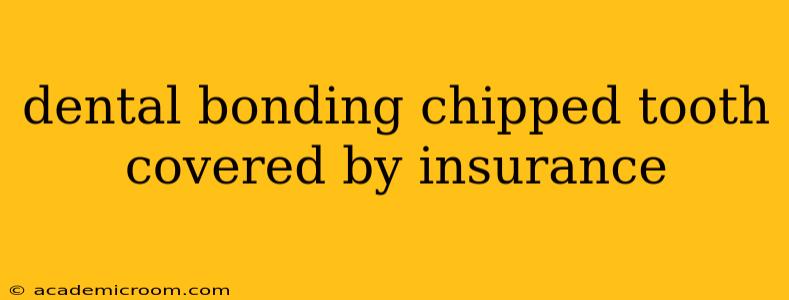A chipped tooth can be a frustrating and unsightly problem, but thankfully, dental bonding offers a quick and effective solution. Many people wonder about the cost, however, and whether their insurance will cover the procedure. This comprehensive guide will delve into the specifics of dental bonding for chipped teeth and insurance coverage, answering all your burning questions.
What is Dental Bonding?
Dental bonding is a cosmetic dental procedure used to repair chipped, cracked, or discolored teeth. A tooth-colored resin material is applied to the affected tooth and sculpted to match the surrounding teeth. The resin is then hardened using a special light, creating a seamless and natural-looking repair. It's a relatively quick procedure, often completed in a single visit to the dentist.
Is Dental Bonding for a Chipped Tooth Covered by Insurance?
This is the million-dollar question. The answer, unfortunately, isn't a simple yes or no. Insurance coverage for dental bonding depends heavily on several factors:
- Your specific insurance plan: Different dental insurance plans have varying levels of coverage for cosmetic procedures. Some plans may cover bonding if it's considered medically necessary (e.g., to protect the tooth from further damage or infection), while others may not cover it at all, or only cover a portion of the cost.
- The reason for the chip: If the chip is due to an accident, your insurance might be more likely to cover the bonding as it's considered restorative rather than purely cosmetic. If the chip is caused by wear and tear or general neglect, the coverage might be less generous or nonexistent.
- Your deductible and co-pay: Even if your plan covers bonding, you'll likely have to meet your deductible before the insurance kicks in. You'll also likely have a co-pay for the procedure.
How Much Does Dental Bonding Cost?
The cost of dental bonding can vary significantly depending on several factors, including:
- The location of your dentist: Costs vary geographically.
- The extent of the damage: A small chip will naturally cost less than a large, complex repair.
- The number of teeth needing bonding: Bonding multiple teeth will obviously increase the overall cost.
It's always best to contact your dental insurance provider and your dentist directly to get a personalized estimate and understand your coverage before proceeding with the treatment.
Does dental insurance cover cosmetic bonding?
Many dental insurance plans don't fully cover cosmetic procedures like bonding, unless deemed medically necessary. It's crucial to check your policy details or contact your provider to determine the extent of your coverage for cosmetic bonding.
What if my insurance doesn't cover dental bonding?
If your insurance doesn't cover bonding, consider exploring payment plans offered by your dentist or investigating financing options. Many dental practices have flexible payment arrangements to help manage the cost.
How can I prevent chipped teeth?
Preventing chipped teeth is always preferable to needing repairs. You can take proactive steps, such as:
- Wearing a mouthguard during sports: This is crucial for protecting your teeth from impacts.
- Avoiding hard foods: Steer clear of biting down on hard objects like ice or nuts.
- Practicing good oral hygiene: Maintaining good oral health helps prevent tooth decay and weakening.
Is dental bonding permanent?
While durable, dental bonding isn't permanent. With proper care, it can last for several years, but it might eventually chip, crack, or discolor and require replacement.
What are the alternatives to dental bonding for a chipped tooth?
Alternatives to dental bonding include dental veneers, crowns, or inlays/onlays, each with its own cost and longevity implications. Your dentist will help determine the best treatment option based on your specific situation.
Remember to always consult with your dentist and insurance provider to fully understand the costs and coverage associated with dental bonding for your chipped tooth. Open communication is key to ensuring a smooth and affordable dental experience.
